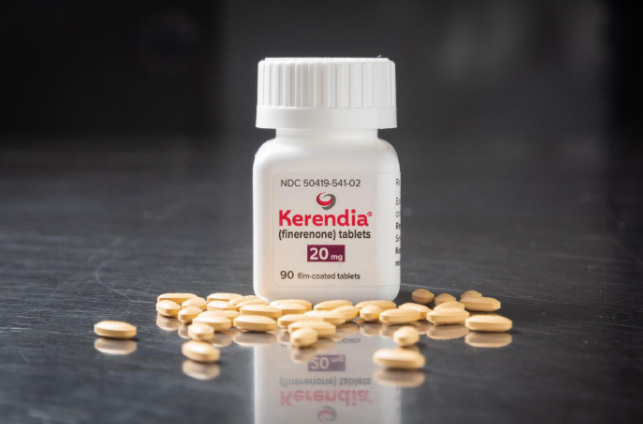
A Bayer drug developed to treat kidney dysfunction in type 2 diabetes patients now has FDA approval, giving the drug giant a product that can compete against already established therapies sold by AstraZeneca and Johnson & Johnson.

With the Rise of AI, What IP Disputes in Healthcare Are Likely to Emerge?
Munck Wilson Mandala Partner Greg Howison shared his perspective on some of the legal ramifications around AI, IP, connected devices and the data they generate, in response to emailed questions.
People who have type 2 diabetes are at a high risk of kidney problems, including chronic kidney disease—damage to the organ that prevents it from filtering blood properly. Ineffective filtering can spark a cascade of other complications, potentially progressing to kidney failure.
The FDA on Friday approved the Bayer drug, finerenone, for the reduction in the risk of kidney function decline, kidney failure, or cardiovascular problems in adults whose chronic kidney disease is associated with type 2 diabetes. Bayer will market the once-a-day tablet under the name “Kerendia.”
Scar tissue and inflammation characteristic of chronic kidney disease are believed to be associated with overactivation of the mineralocorticoid receptor. Bayer’s Kerendia is designed to block this receptor—the drug is the first one approved that works by this mechanism. It’s a different approach than AstraZeneca’s Farxiga and Johnson & Johnson’s Invokana, which belong to a class of type 2 diabetes drugs called SGLT2 inhibitors. Invokana’s label includes the reduction of the risk of end-stage renal disease. That drug generated generated $795 million in 2020 revenue, according to J&J’s annual report. Farxiga, which accounted for $1.9 billion in global sales in 2020, added chronic kidney disease to its label in April.
FDA approval of the Bayer drug was based on the results of a double-blind, placebo-controlled Phase 3 study enrolling 5,674 adults whose chronic kidney disease was associated with type 2 diabetes. Patients were randomly assigned to receive the Bayer drug or a placebo and were followed for a median 2.6 years.
The goal of the study was to assess patients according to a combined endpoint that included a reduction in kidney function of at least 40%, progression to kidney failure, or death from kidney problems. The study showed a significant reduction in the risks of these problems in patients who were given Kerendia, with 504 of the 2,833 patients in the test drug group having at least one of those events compared to 600 of the 2,841 patients who received a placebo.
Patients in the study were also assessed for cardiovascular death, non-fatal heart attack, non-fatal stroke, or hospitalization for heart failure. Measured against these secondary cardiovascular goals, the Bayer drug also showed a significantly lower incidence of problems compared to the placebo group. The full study results were published late last year in the New England Journal of Medicine.
Side effects reported in the trials included high levels of potassium, low blood pressure, and low levels of sodium in the blood. The Kerendia label warns patients against taking the drug with other medicines that are CYP3A4 inhibitors. Blocking CYP3A4, an enzyme found in the liver and intestine, can lead to an amplification of Kerendia’s effect to potentially dangerous levels. Patients are also cautioned not to consume grapefruits or grapefruit juice, which are also CYP3A4 inhibitors.
Bayer expects to make Kerendia available in the U.S. by the end of this month. The company has also submitted the drug for regulatory review in Europe.
Photo by Bayer














